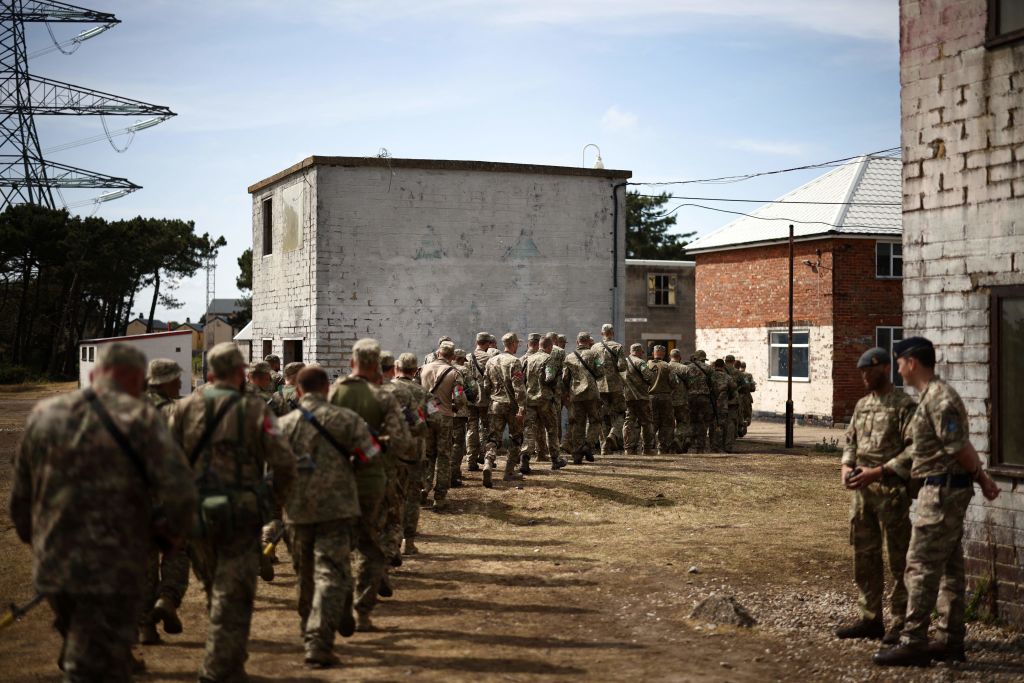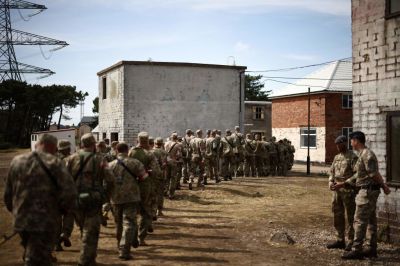Fear of escalation has been a mainstay of the West’s response to Russia’s invasion of Ukraine in February 2022, and anxieties flared again this week after rumors spread that the United Kingdom planned to deploy military instructors within Ukraine. Facebook posts such as this one have questioned the potential for a “hot war” between NATO and Russia. “Breaking news has come out today as the British army will now be entering Ukraine in full force,” the video clipped in the post claims, though it goes on to note that the U.K. would only be engaging in non-combatant roles for now.
The video itself, which was posted originally on YouTube by a U.S. based streamer called The Enforcer, is not particularly sensationalist and appears to be largely fact-driven. The Enforcer, which has more than 160,000 subscribers on YouTube, hosts live streams most evenings that cover recent developments in Ukraine. He describes himself as a supporter of the Ukrainian war effort and a brief review of his content does not reveal any obvious efforts to misinform. The Enforcer did not immediately respond when contacted for comment by The Dispatch Fact Check.
Rumors of a U.K deployment began after U.K. Defense Secretary Grant Shapps raised the possibility of “eventually” sending British troops to train Ukrainian soldiers in an interview with the Telegraph. Shapps, who was appointed in late August following the resignation of Ben Wallace, appeared to suggest that the U.K. was exploring the possibility of establishing manufacturing capacity in Ukraine as well. “I think there’s a point at which, I was talking today about eventually getting the training brought closer and actually into Ukraine as well,” Shapps said. “Particularly in the west of the country, I think the opportunity now is to bring more things ‘in country’—not just training, but also … move into manufacturing in country, for example. I’m keen to see other British companies do their bit as well by doing the same thing. So I think there will be a move to get more training and production in the country.”
British Prime Minister Rishi Sunak quickly walked back his colleague’s comments, however, stating that there are no plans to deploy military instructors in Ukraine. “What the defense secretary was saying was that it might well be possible one day in the future for us to do some of that training in Ukraine,” Sunak said at the Conservative Party conference this week. “But that’s something for the long term, not the here and now. There are no British soldiers that will be sent to fight in the current conflict.”
Though the U.K. has helped to train thousands of Ukrainian soldiers since the beginning of the current conflict, this training has taken place within the U.K. Aside from small numbers of personnel to provide embassy security, NATO countries have thus far been reluctant to host their own militaries in Ukraine due to the risk of direct conflict with Russia and the escalation that could entail. Former Russian President Dmitry Medvedev, a close ally of Vladimir Putin, responded to Shapps’ statements by saying that any British military instructors present in Ukrainian territory would be legitimate targets for Russian attacks.
Despite the downplaying of Shapps’ remarks, British officials are generally in favor of moving training, manufacturing, and equipment repair as close to Ukraine as possible in the long run, Luke Coffey, a former senior special adviser to British Defense Secretary Liam Fox tells The Dispatch Fact Check. “Maybe someday the security situation might allow [training] to be done inside Ukraine, but the general thinking is this has to at least be done closer to Ukraine,” Coffey said. The U.K. has been Ukraine’s second-largest provider of military aid, after the U.S., since the Russian invasion in February 2022, but even Downing Street is unlikely to take the risk of deploying personnel to the country anytime soon. “Do I think we’re anywhere near that in terms of the reality on the ground?” Coffey continued. “No, I don’t, I think it’s too high-risk at this point.”
If you have a claim you would like to see us fact check, please send us an email at factcheck@thedispatch.com. If you would like to suggest a correction to this piece or any other Dispatch article, please email corrections@thedispatch.com.







Please note that we at The Dispatch hold ourselves, our work, and our commenters to a higher standard than other places on the internet. We welcome comments that foster genuine debate or discussion—including comments critical of us or our work—but responses that include ad hominem attacks on fellow Dispatch members or are intended to stoke fear and anger may be moderated.
With your membership, you only have the ability to comment on The Morning Dispatch articles. Consider upgrading to join the conversation everywhere.